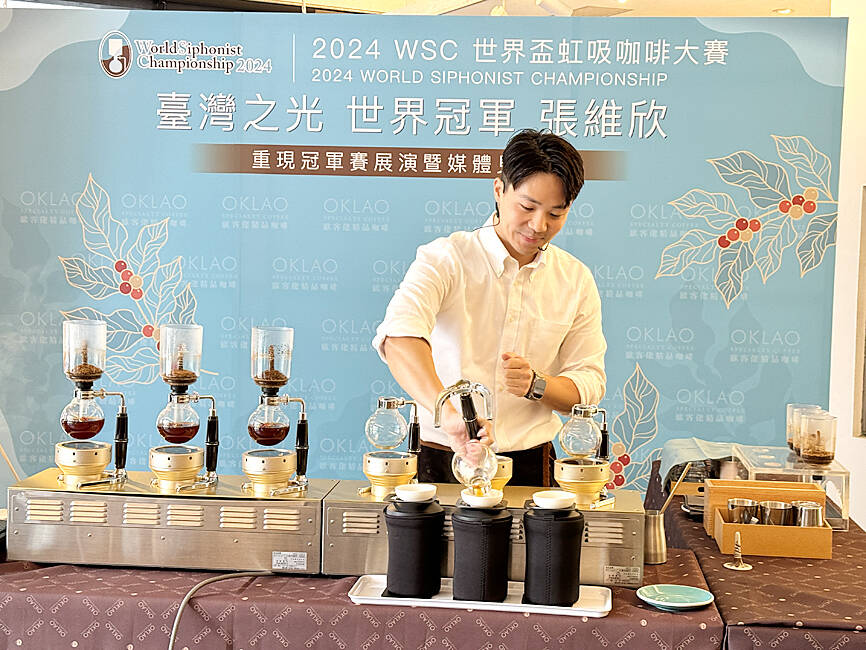Taiwanese barista Chang Wei-shin (張維欣) yesterday shared his secrets to winning this year’s World Siphonist Championship (WSC) in Tokyo, five years after finishing in second place in the 2018 edition of the competition.
The WSC is an annual competition on who can brew the best siphon coffee, hosted by the Specialty Coffee Association of Japan.
In the competition that took place last month, contestants brewed three cups of blended siphon coffee and three original signature beverages in 15 minutes.

Photo: Ou Su-mei, Taipei Times
Time pressure, as well as high temperatures, can combine to make coffee taste bitter and provide a significant challenge in the competition, Chang told a news conference in Taichung.
In preparation for this year’s WSC, he said he took a two-week trip to Panama where he visited the Flying Pumas estate, a specialty coffee farm that calls itself a “sanctuary.”
Chang said he used coffee from the estate in the portion of the contest for original coffee blends, seeking to introduce to the judges its unique flavor and scent.
To control the water temperature, its flow rate and other factors, he worked with a Taiwanese ceramic artist to design a custom coffee filter that lowered the water temperature as well as allow for further circulation, Chang said, adding that he used a computer-controlled roaster, which allowed him to fine-tune adjustments to the roasting process.
Both these factors allow for better extraction, improved the coffee’s flavor and brought forth a fruity aroma, he said.
In the creative coffee segment, Chang created a coffee cherry tea infusion with sweet syrup, chickpea water and fermented coffee cherry husks.

The first global hotel Keys Selection by the Michelin Guide includes four hotels in Taiwan, Michelin announced yesterday. All four received the “Michelin One Key,” indicating guests are to experience a “very special stay” at any of the locations as the establishments are “a true gem with personality. Service always goes the extra mile, and the hotel provides much more than others in its price range.” Of the four hotels, three are located in Taipei and one in Taichung. In Taipei, the One Key accolades were awarded to the Capella Taipei, Kimpton Da An Taipei and Mandarin Oriental Taipei. Capella Taipei was described by

EVA Airways today confirmed the death of a flight attendant on Saturday upon their return to Taiwan and said an internal investigation has been launched, as criticism mounted over a social media post accusing the airline of failing to offer sufficient employee protections. According to the post, the flight attendant complained of feeling sick on board a flight, but was unable to take sick leave or access medical care. The crew member allegedly did not receive assistance from the chief purser, who failed to heed their requests for medical attention or call an ambulance once the flight landed, the post said. As sick

The Taichung District Court yesterday confirmed its final ruling that the marriage between teenage heir Lai (賴) and a man surnamed Hsia (夏) was legally invalid, preventing Hsia from inheriting Lai’s NT$500 million (US$16.37 million) estate. The court confirmed that Hsia chose not to appeal the civil judgement after the court handed down its ruling in June, making the decision final. In the June ruling, the court said that Lai, 18, and Hsia, 26, showed “no mutual admiration before the marriage” and that their interactions were “distant and unfamiliar.” The judge concluded that the couple lacked the “true intention of

A drunk woman was sexually assaulted inside a crowded concourse of Taipei Railway Station on Thursday last week before a foreign tourist notified police, leading to calls for better education on bystander intervention and review of security infrastructure. The man, surnamed Chiu (邱), was taken into custody on charges of sexual assault, taking advantage of the woman’s condition and public indecency. Police discovered that Chiu was a fugitive with prior convictions for vehicle theft. He has been taken into custody and is to complete his unserved six-month sentence, police said. On Thursday last week, Chiu was seen wearing a white